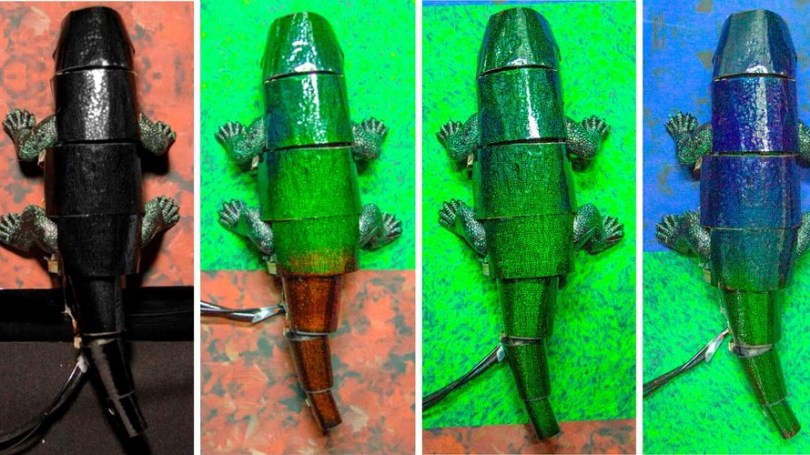South Korean researchers say they have developed a skin-like material that behaves like the skin of a chameleon.
韩国研究人员称,他们已经开发出一种类似于变色龙皮肤的皮肤材料。
It can change colors to look like its surroundings.
它可以改变颜色,使其看起来像它周围的环境。
The team was led by Ko Seung-hwan, a mechanical engineering professor at Seoul National University.
该研究小组由首尔大学机械工程系教授高承焕领导。
The team created the skin with a special liquid that turns colors in different temperatures.
该团队用一种特殊的液体创造了皮肤,这种液体在不同的温度下会变色。
These changes are controlled by flexible heaters made of very small wires.
这些变化是由非常细的电线制成的柔性加热器控制的。
If you are in a desert, and you wear forest-colored clothing, you can easily be seen, Ko told Reuters news agency.
高在接受路透社采访时说,如果你在沙漠中穿着森林色的衣服,你会很容易被发现。
Changing colors and forms actively with your surroundings is central to the technology, Ko said.
高说,该技术的核心是根据周围环境主动改变颜色和形状。
The technology uses something called thermochromic liquid crystal and silver nanowire heaters.
这项技术使用了一种叫做热变色液晶和银纳米线加热器的东西。
Thermochromic means heat causes the colors to change.
热变色是指热量使颜色发生变化。
Nanowires are just like normal electrical wires, but they are extremely small.
纳米线就像普通的电线一样,但是它们非常细。
Ko and the team demonstrated this technology using a chameleon-shaped robot with color-seeking sensors.
高和他的团队用一个带有颜色搜寻传感器的变色龙形状的机器人演示了这项技术。

The skin tried to copy whatever colors the sensors "saw" around it.
皮肤试图复制传感器在周围“看到”的任何颜色。
In a video, the robot walked on red, blue and green floors.
在一段视频中,机器人在红色、蓝色和绿色的地板上行走。
It immediately changed color to look like its surroundings.
它立即改变了颜色,看起来像它周围的环境。
Ko explained to Reuters how the material works.
高向路透社解释了这些材料的工作原理。
He said when the sensors find color information, they move that information to a very small processor.
他说,当传感器发现颜色信息时,它们会将信息转移到一个非常小的处理器上。
Then, the information goes to silver nanowire heaters.
然后,信息被传送到银纳米线加热器。
When the heaters reach a specified temperature, the thermochromic liquid crystal changes its color, Ko said.
当加热器达到特定温度时,热变色液晶就会改变颜色。
Though the skin is made of many layers, its total thickness is less than a hundred micrometers.
虽然皮肤是由许多层组成的,但它的总厚度还不到100微米。
In other words, it is thinner than a human hair.
换句话说,它比人的头发还薄。
By adding more silver nanowire layers in simple shapes like lines or squares, the skin can create complex designs.
通过在线条或正方形等简单形状中添加更多的银纳米线层,皮肤可以创造出复杂的设计。
"The flexible skin can be developed as a wearable device and used for fashion," Ko said.
高说:“柔韧的皮肤可以被开发为可穿戴设备并用于时装。”
It can also be used in military clothing and to create designs on the outside of cars and buildings, he said.
他说,它还可以用于军用服装以及汽车和建筑的外观设计。
The team's research was published in the journal Nature Communications in August.
该团队的研究发表在8月份的《自然通讯》期刊上。
I'm Alice Bryant.
爱丽丝·布赖恩特为您播报。
译文为可可英语翻译,未经授权请勿转载!












